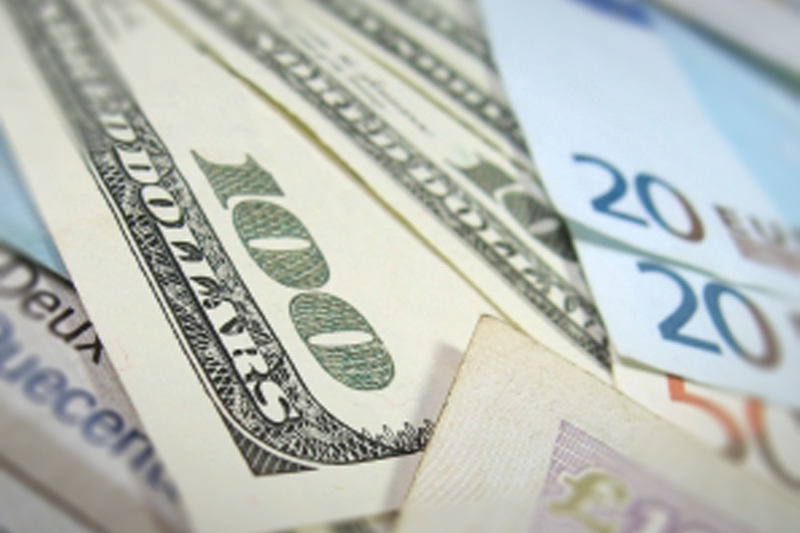* Graphic: World FX rates in 2019 http://tmsnrt.rs/2egbfVh
By Saikat Chatterjee
LONDON, Aug 12 (Reuters) - The yen rose to its highest level
in more than 1-1/2 years versus the dollar on Monday as
investors ramped up bets that the Japanese currency could gain
more in the case of a prolonged China-U.S. trade conflict.
Apart from its status as a perceived safe-haven currency
which gains during periods of economic stress, the yen was also
benefiting from growing expectations that the U.S. dollar may be
ending a period of extended weakness after recent comments.
"Ongoing strength in the yen is yet another signal of the
shift in sentiment towards a US dollar that could start to
weaken soon, especially if fears of 'intervention' become more
justified," said John Marley, a senior currency consultant at FX
risk management specialist, SmartCurrencyBusiness.
Fears that U.S. officials might embark on trying to weaken
the dollar have grown after Beijing weakened its currency below
a psychological 7 per dollar level earlier this month, signaling
an escalation in the ongoing trade war with Washington.
Against the dollar JPY=EBS the yen climbed 0.5% to 105.15
yen, its highest level against the U.S. currency since March
2018, barring a flash crash in January this year.
The yen also registered similar gains against the euro
EURJPY= , rising by more than half a percentage point to its
highest level in April 2017.
"Risk indicators and global markets have become more shaky
and the yen is reflecting those concerns, and safe-haven
shelters like the yen and the Swiss franc should continue to
benefit," said Commerzbank currency strategist Esther Reichelt.
Goldman Sachs has cut its forecast for U.S. economic growth,
warning at the weekend that a trade deal is unlikely before the
2020 presidential election and that the risks of recession are
increasing. The yen is the top performer among its big rivals in global
foreign exchange markets, rising 3% this month as investors have
shown increased demand for Japanese government bonds after China
weakened the yuan below 7 per dollar last week.
As a result, hedge funds that usually borrow in yen to
finance leveraged bets in other asset classes have been forced
into a rapid unwinding of short positions on the yen, sending
the Japanese currency higher.
SWISS INTERVENTION
Demand for perceived safe-haven assets in the currency
market surged after Friday's comments from U.S. President Donald
Trump, saying that the United States would not agree a trade
deal with Beijing for now. That has put some policymakers in a tricky spot. The Swiss
National Bank, for example, was forced to intervene in currency
markets to prevent the franc from appreciating sharply.
Sight deposits held at the SNB rose by 2.77 billion Swiss
francs ($2.84 billion) in the week to Aug. 9, suggesting the SNB
had stepped up intervention on foreign exchange markets to rein
in the safe-haven currency. Against the dollar and the euro, the Swiss franc
strengthened 0.1% each.
All eyes will be on Chinese figures on July retail sales and
industrial output, due on Wednesday, to gauge the impact on
domestic activity from the long-running trade conflict with the
United States.
Market attention will also be on the U.S. Federal Reserve
annual symposium at Jackson Hole later in the week, with
investors seeking greater clarity on the future path of interest
rates. Markets are expecting 60 basis points of rate cuts from
the Fed by the end of the year. FEDWATCH
The rest of the foreign exchange market, meanwhile, saw
major currencies such as the euro and the dollar pinned in tight
ranges.
The euro was broadly steady against the dollar at $1.1194
EUR= , bound between resistance at $1.1249 and support at
$1.1175.
<^^^^^^^^^^^^^^^^^^^^^^^^^^^^^^^^^^^^^^^^^^^^^^^^^^^^^^^^^^^
Hedge funds and JPY https://tmsnrt.rs/2YGkfdt
SNB sight deposits and EURCHF https://tmsnrt.rs/2YCuxLo
^^^^^^^^^^^^^^^^^^^^^^^^^^^^^^^^^^^^^^^^^^^^^^^^^^^^^^^^^^^>
